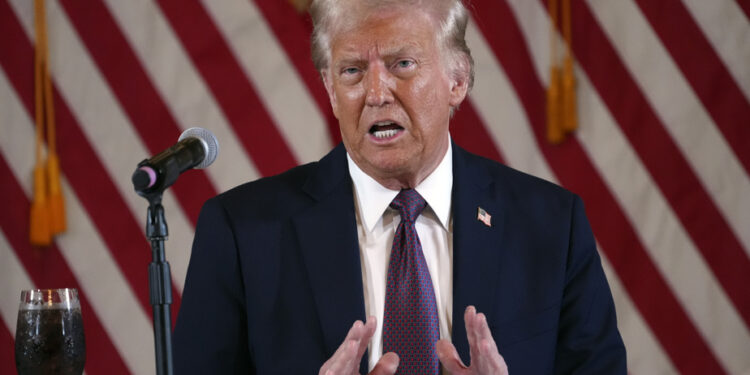(New York) United States President-elect Donald Trump was formally sentenced Friday in his secret payments case in New York, but the judge refused to impose any punishment.
The announcement solidifies Mr. Trump’s conviction before he returns to power, while allowing him to return to the White House without the threat of prison time or a fine.
Donald Trump’s unconditional release caps a norm-shattering case that saw the former and future president charged with 34 crimes, tried for nearly two months and convicted by jury on each count .
Ten days before Donald Trump’s inauguration, Judge Juan M. Merchan indicated that he planned a sentence without penalty called absolute release, and prosecutors did not oppose it. This means there is no jail time, no probation, and no fines to impose.
PHOTO SETH WENIG, ASSOCIATED PRESS ARCHIVES
Judge Juan Merchan
Judge Juan M. Merchan could have sentenced the 78-year-old Republican to up to four years in prison. Instead, he chose a sentence that skirted thorny constitutional questions in ending the case but ensured that Mr. Trump would become the first person convicted of a crime to assume the presidency.
In that trial, Mr. Trump was accused of falsifying his company records to conceal a US$130,000 payment to pornographic actress Stormy Daniels. She was paid at the end of Donald Trump’s 2016 campaign not to speak publicly about a sexual relationship she claims she had with him a decade earlier.
Mr. Trump on Friday called his criminal conviction a “disgrace to the system.”
He appeared by video at the hearing, where the judge guaranteed that he would not receive any custodial sentence.
PHOTO ANGELA WEISS, AGENCE FRANCE-PRESSE
Donald Trump and his lawyer Todd Blanche appear on screen in Manhattan Criminal Court, January 10, 2025.
Donald Trump had argued that there was no sexual intercourse between them and maintains that his political opponents made up a false accusation to try to harm him.
“I have never falsified business documents. This is a false, made-up accusation,” the Republican president-elect wrote on his Truth Social platform last week. Manhattan District Attorney Alvin Bragg, whose office brought the charges, is a Democrat.
“I wasn’t hiding anything”
Mr. Bragg’s office argued in a court filing Monday that Mr. Trump committed “serious offenses that caused significant harm to the sanctity of the electoral process and the integrity of New York’s financial market.”
While the specific accusations involved checks and ledgers, the underlying accusations were sordid and deeply tied to Mr. Trump’s political rise. Prosecutors said Stormy Daniels was paid – through Mr Trump’s personal lawyer at the time, Michael Cohen – as part of a broader effort to keep voters from hearing about Donald Trump’s alleged extramarital escapades.
PHOTO MARKUS SCHREIBER, ASSOCIATED PRESS ARCHIVES
Stormy Daniels
Mr. Trump denies that the alleged meetings took place. His lawyers said he wanted to suppress the stories to protect his family, not his campaign. And while prosecutors have said Mr. Cohen’s payments were deceptively recorded as legal fees, Mr. Trump says that is simply what they were.
“We couldn’t have called them anything else,” he stressed on his social network. I wasn’t hiding anything. »
Presidential immunity mentioned
Donald Trump’s lawyers tried in vain to prevent a trial. Since his conviction in May on 34 counts of falsifying business records, they have used virtually every legal lever within their reach to try to get the conviction overturned, the case dismissed or at least postponement of sentencing.
They made various arguments to Judge Merchan, New York appellate judges and federal courts, including the Supreme Court. Mr. Trump’s lawyers have leaned heavily on arguments for presidential immunity from prosecution, and they received a boost in July in a Supreme Court ruling that grants former commanders in chief sweeping immunity.
Donald Trump was a private citizen and presidential candidate when Stormy Daniels was paid in 2016. He was president when the reimbursements to Mr. Cohen were made and recorded the following year.
On one hand, Mr. Trump’s defense argued that immunity should have prevented jurors from hearing certain evidence, such as testimony about some of his conversations with Hope Hicks, then the White House communications director. .
And after Mr. Trump won last November’s election, his lawyers argued that the case should be dropped to avoid impinging on his upcoming presidency and his transition to the Oval Office.
Judge Merchan, a Democrat, repeatedly postponed the sentencing, originally scheduled for July. But last week he set the date for Friday, citing the need for “finality.” He wrote that he was striving to balance Mr. Trump’s need to govern, the Supreme Court’s ruling on immunity, due respect for the jury’s verdict and the public’s expectation that ” no one is above the law.”
Mr. Trump’s lawyers then launched a flurry of last-minute efforts to block the conviction. Their last hope faded Thursday evening with a 5-4 Supreme Court ruling that refused to delay sentencing.
Other files at a standstill
Meanwhile, other criminal cases that once weighed against Mr. Trump have ended or been stalled before trial.
After Mr. Trump’s election, special prosecutor Jack Smith ended federal prosecutions over his handling of classified documents and his efforts to overturn his 2020 election loss to Democrat Joe Biden. A Georgia state election interference case is in limbo after prosecutor Fani Willis was removed from her role in the case.



